 Early on the morning of September 11, 2001, the United States seemed to be just about the safest place in the world to live. The nation hadn’t been attacked on its own soil since the bombing of Pearl Harbor six decades before.
Early on the morning of September 11, 2001, the United States seemed to be just about the safest place in the world to live. The nation hadn’t been attacked on its own soil since the bombing of Pearl Harbor six decades before.
War seemed like something that happened elsewhere. Perhaps, that, more than anything, is what made the massive terror attacks of that day so shocking.
The 9/11 attack on the World Trade Center and the Pentagon was unprecedented in the scale of its destruction and the immediacy of its visual impact.
Americans had heard or read about other historical disasters, but this was the first to be witnessed by hundreds of millions of citizens as it occurred. The impact on society was dramatic and long lasting.
The first plane to hit its target was American Airlines Flight 11. It was flown into the North Tower of the World Trade Center complex in Lower Manhattan at 8:46 am.
Within minutes, live televised images of the burning skyscraper were breaking into the morning news. Many believed it must have been an accident. Seventeen minutes later at 9:03 am, the World Trade Center’s South Tower was hit by United Airlines Flight 175.
As a third plane hit Pentagon-the headquarters of the US armed forces-outside Washington D.C., and a fourth plane crashed in a field in Pennsylvania, few believed this could be anything but an attack on the United States.

A distant view of the burning towers as seen from Brooklyn. (Photo by Neville Elder).
In the World Trade Center, people were trapped o the floors above the impact zone, unable to escape through damaged stairwells. Some scrambled toward the roof, hoping for rescue from above, only to find the way blocked.
Some returned to their desks. They called home. They said good-bye before the floors collapsed beneath them as first the south tower and then the north tower fell, turning thousands, in a moment, into dust.
The fourth, and final flight, United Airlines Flight 93, crashed near Shanksville, Pennsylvania, southeast of Pittsburgh, at 10:03 a.m. after passengers fought the four hijackers. Flight 93’s target is believed to have been either the Capitol or the White House.
Flight 93’s cockpit voice recorder revealed crew and passengers tried to seize control of the plane from the hijackers after learning through phone calls that Flights 11, 77, and 175 had been crashed into buildings that morning. Once it became evident that the passengers might gain control, the hijackers rolled the plane and intentionally crashed it.

New Yorkers gather in the street and watch the World Trade Center go up in flames. (Photo by Spencer Platt).
The attacks are the deadliest terrorist attacks in world history, causing the deaths of 2,996 people (including the hijackers) and injuring more than 6,000 others.
The death toll included 265 on the four planes (from which there were no survivors); 2,606 in the World Trade Center and in the surrounding area; and 125 at the Pentagon.
Most who died were civilians; the rest included 343 firefighters, 72 law enforcement officers, 55 military personnel, and 19 terrorists. At least 200 people fell or jumped to their deaths from the burning towers (as exemplified in the photograph The Falling Man), landing on the streets and rooftops of adjacent buildings hundreds of feet below.
After New York, New Jersey lost the most state citizens. More than 90 countries lost citizens in the attacks; for example, the 67 Britons who died were more than in any other terrorist attack anywhere.

Collapse of the towers as seen from across the Hudson River in New Jersey.
The destruction of the World Trade Center and nearby infrastructure seriously harmed the economy of New York City and created a global economic recession.
Many countries strengthened their anti-terrorism legislation and expanded the powers of law enforcement and intelligence agencies to prevent terrorist attacks.
The U.S. and Canadian civilian airspaces were closed until September 13, while Wall Street trading was closed until September 17. Many closings, evacuations, and cancellations followed, out of respect or fear of further attacks.
Cleanup of the World Trade Center site took eight months and was completed in May 2002, while the Pentagon was repaired within a year.
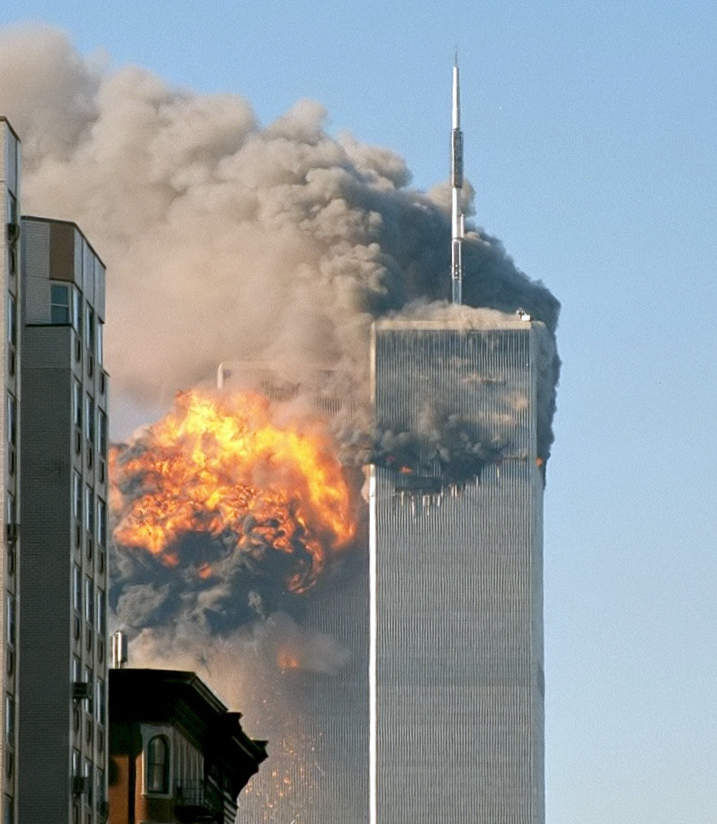
The north face of Two World Trade Center (South Tower) immediately after being struck by United Airlines Flight 175.
In the immediate aftermath of the attacks, suspicion quickly fell onto al-Qaeda. The United States government under the George W. Bush administration formally responded by launching the War on Terror and invading Afghanistan to depose the Taliban, which had not complied with U.S. demands to expel al-Qaeda from Afghanistan and extradite al-Qaeda leader Osama bin Laden. Bin Laden fled to the White Mountains where he came under attack by U.S.-led forces, but managed to escape.
Although bin Laden initially denied any involvement, in 2004 he formally claimed responsibility for the attacks. Al-Qaeda and bin Laden cited U.S. support of Israel, the presence of U.S. troops in Saudi Arabia, and sanctions against Iraq as motives.
After evading capture for almost a decade, bin Laden was located in a hideout in Abbottabad, Pakistan, and subsequently killed by the U.S. military on May 2, 2011.

Remains of 6, 7, and 1 WTC on September 17.

Mike Scott from California Task Force-8 and his dog, Billy, search through WTC rubble for living or dead victims of the 9/11 attack. (Photo by Andrea Booher).

Rescue workers at Ground Zero.
Collapsed section of the Pentagon.
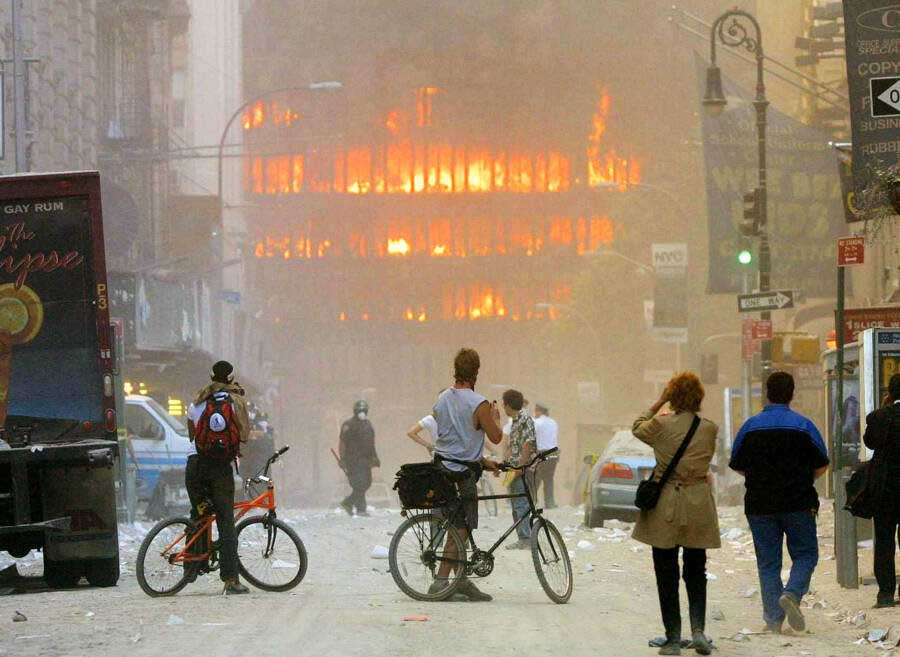
Horrified onlookers stare in disbelief at the WTC inferno as smoke and ash fill the air. (Photo by Mario Tama).

A firefighter emerging from the debris-filled smoke that was once the World Trade Center. (Photo by Jim Watson).

A firefighter calls for more rescue workers to make their way into the rubble. (Photo by Jim Watson).

A New York firefighter gazes at the rubble of one of the towers just after the collapse.

Members of the U.S. Coast Guard watch the towers in the wake of the attacks.

A man falls to his death from the World Trade Center. Many people chose to jump instead of facing the fires within. (Photo by Jose Jimenez),

It took the 110-floor Twin Towers 56 and 102 minutes to collapse from the resulting structural damage.

The destructions of 9/11 attacks.

Firefighters search through the rubble for survivors.

Survivors covered in dust after the collapse of the towers.
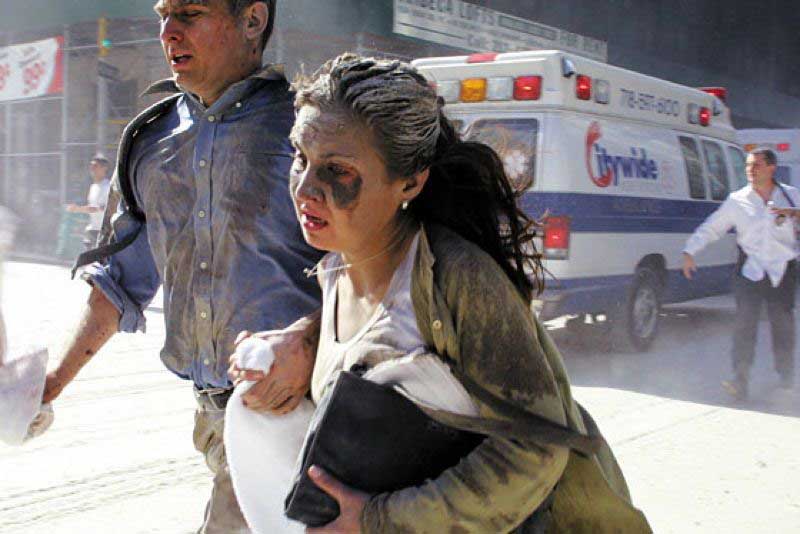
A woman flees from the collapsing towers.
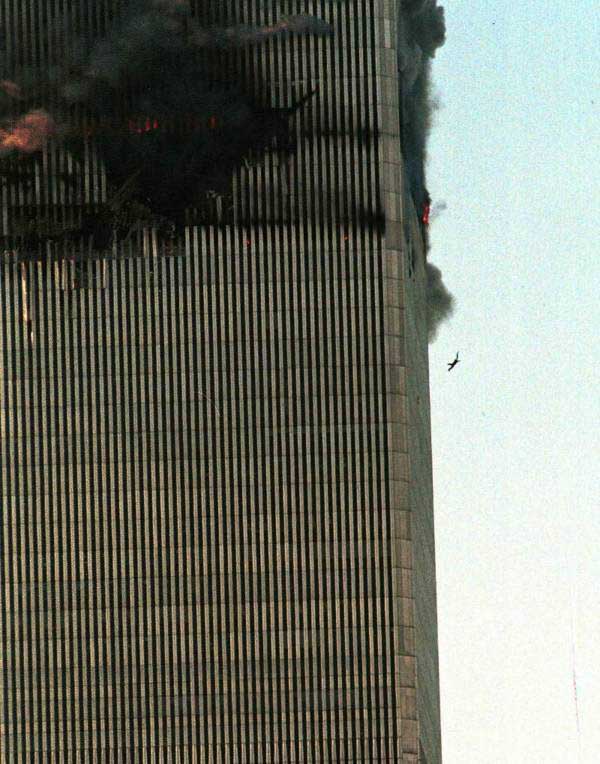
A person jumps from smoke and flames at the World Trade Center. (Photo by Robert Giroux).

A firefighter breaks down after the World Trade Center buildings collapsed (Photo by Mario Tama).
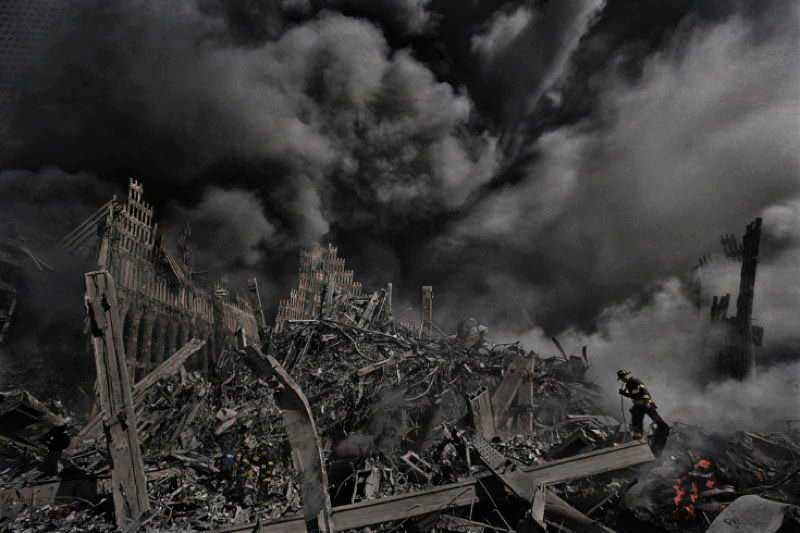
The wreckage of 9/11 attacks.

The moment when President Bush was informed about the 9/11 terrorist attack, 2001.
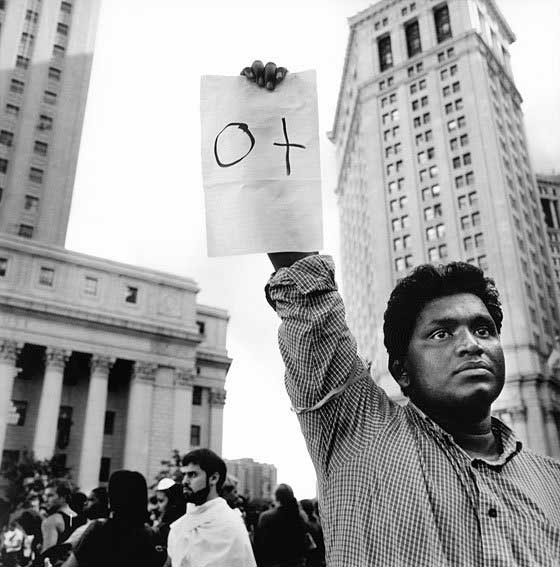
A man holds a sign with his blood type while in line to donate blood in downtown New York. (Photo by James Nachtwey).
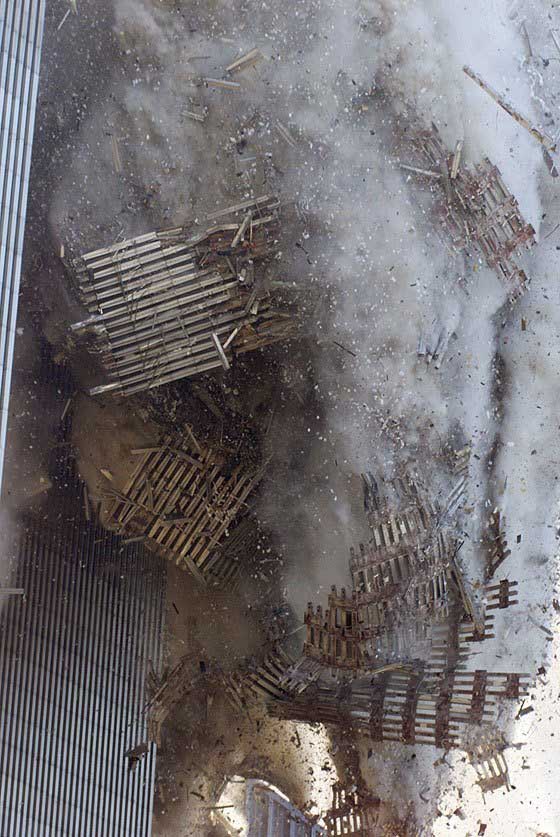

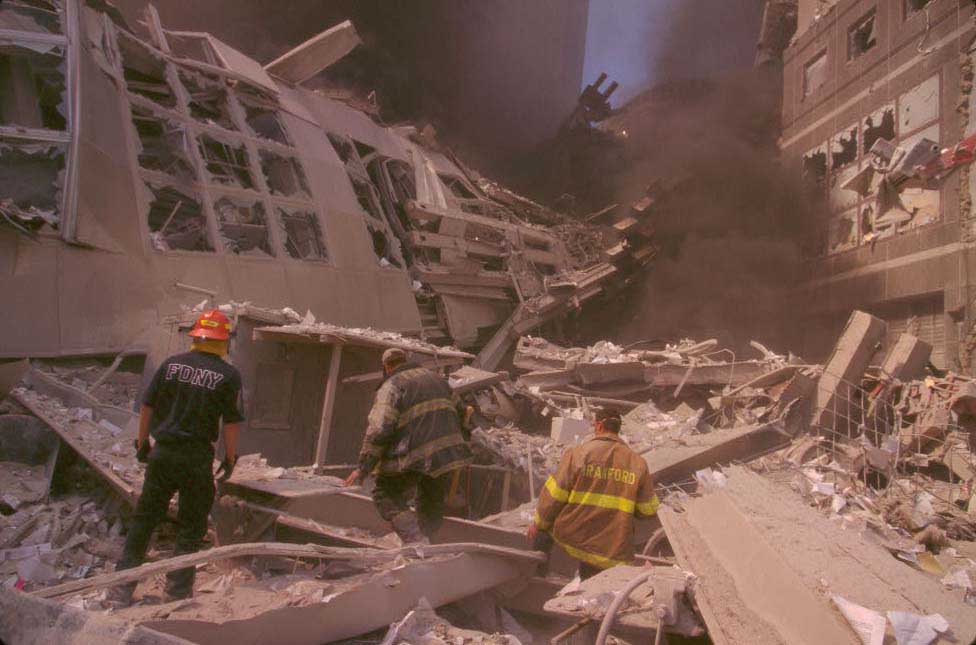


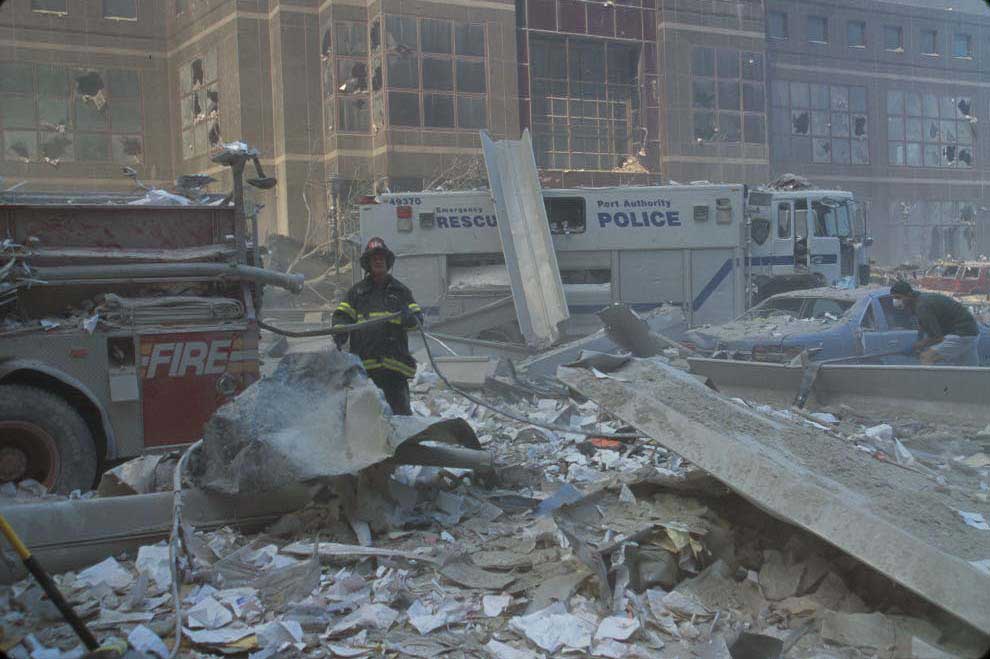

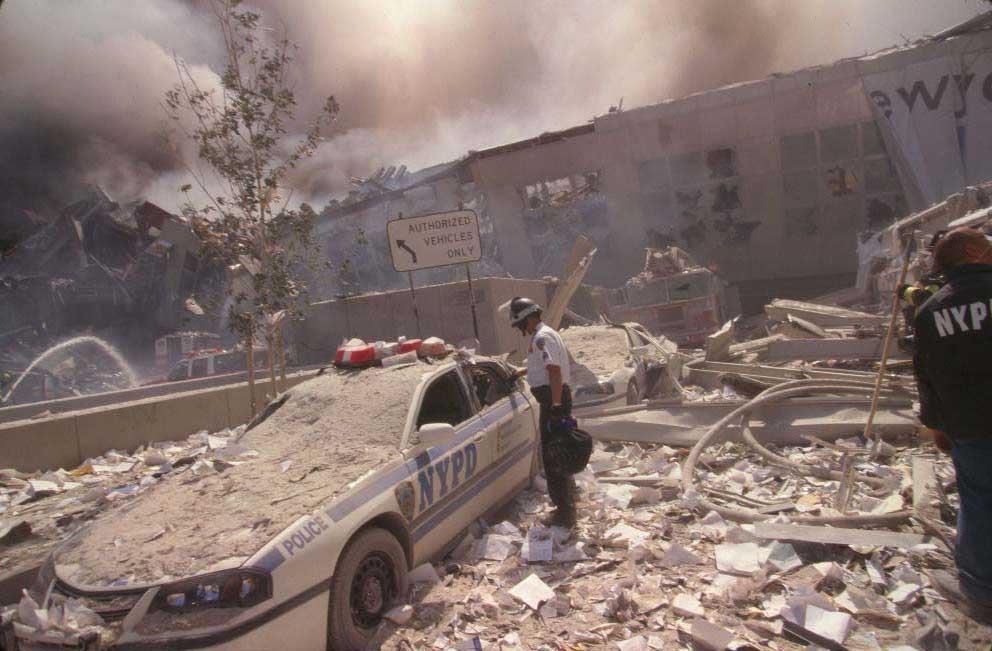


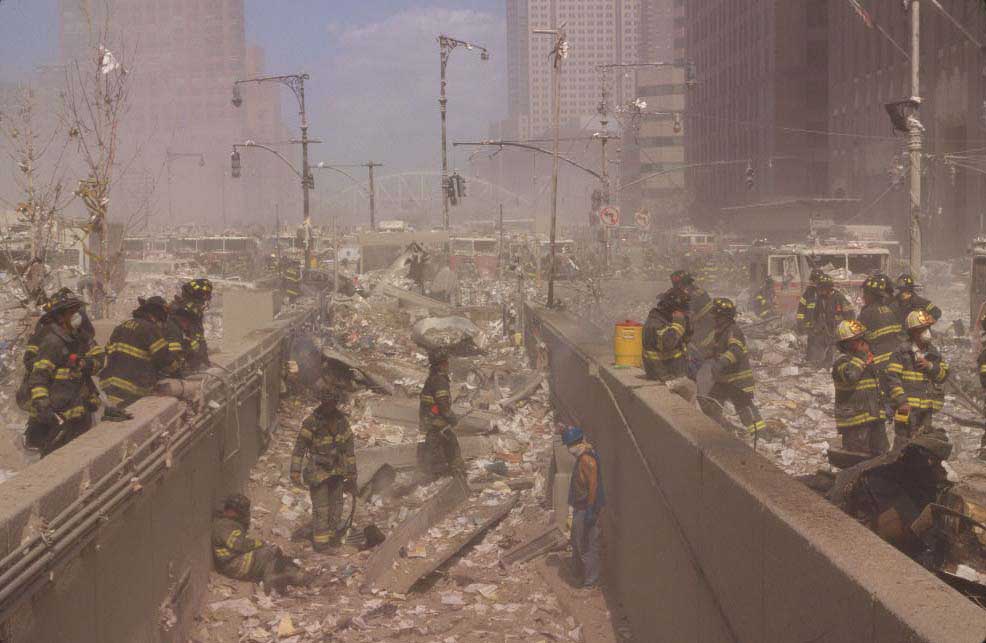
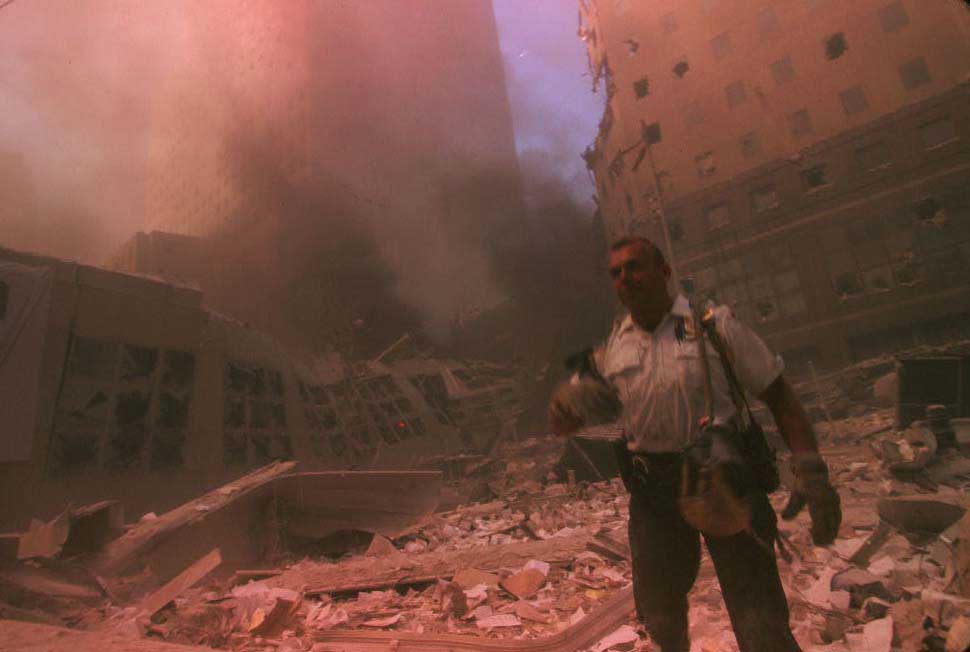
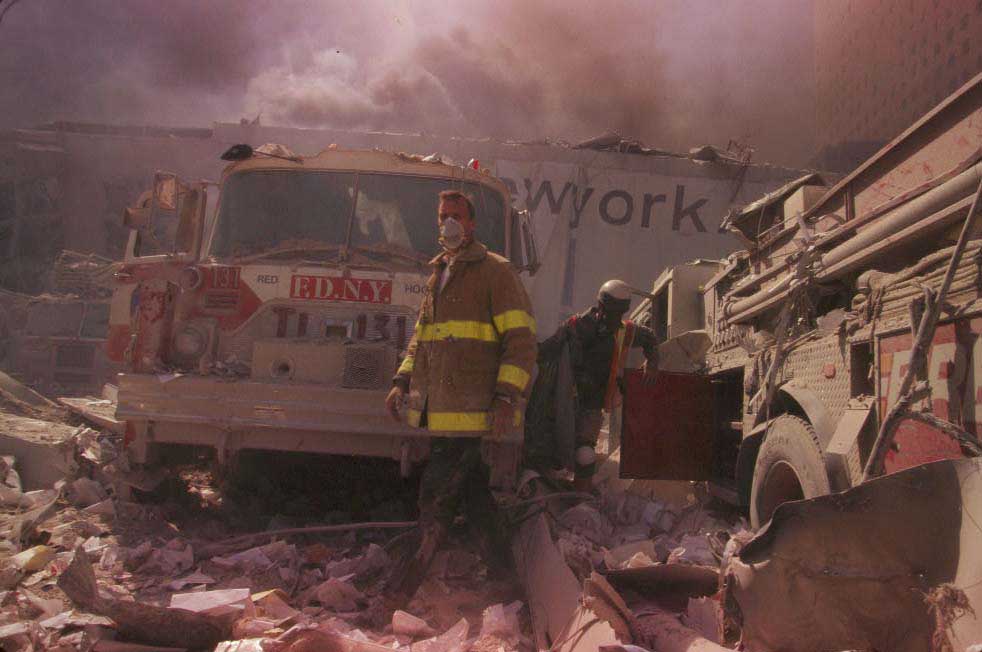


Fragment of the Flight 93 fuselage.

Aerial view of the Pentagon.
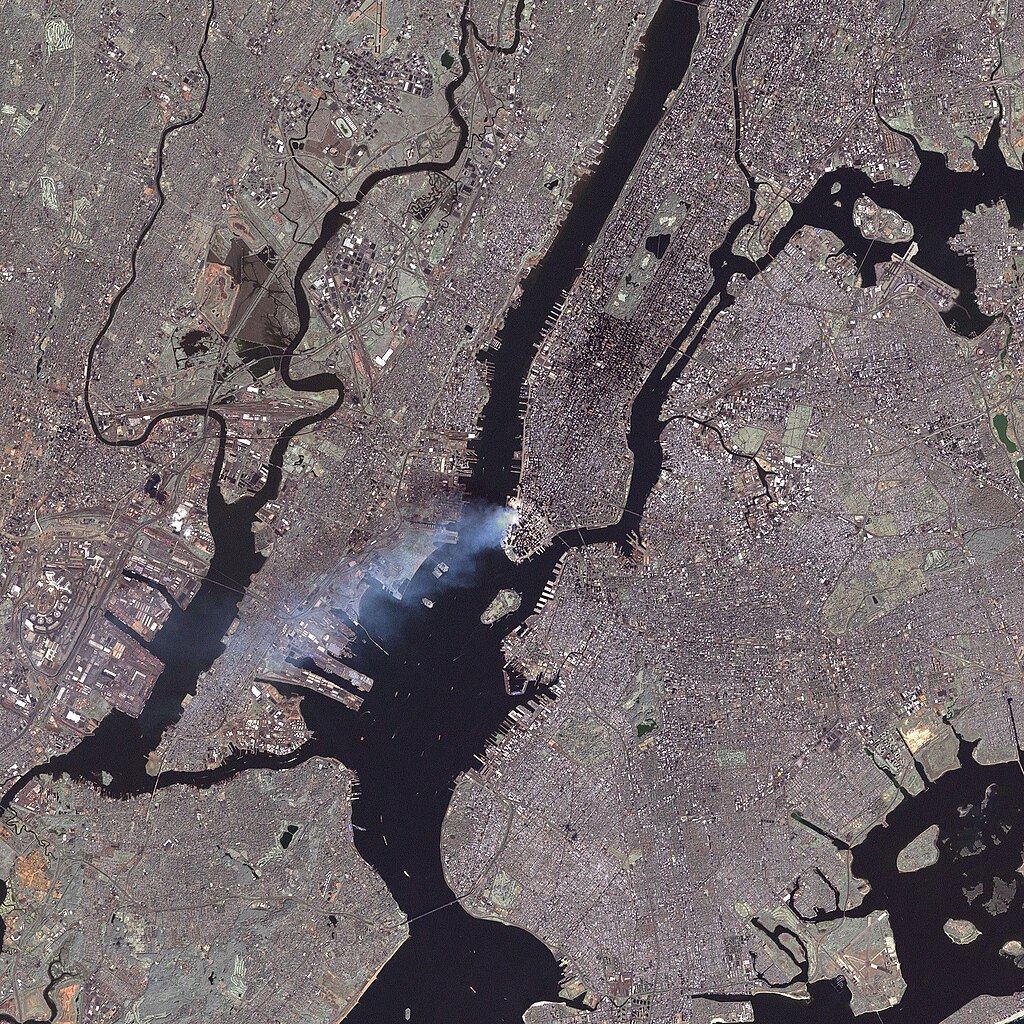
Satellite view of New York City on September 12, photographed by the Enhanced Thematic Mapper Plus (ETM+) camera aboard Landsat 7.

Search and rescue teams inspect the wreckage at Ground Zero on September 13.